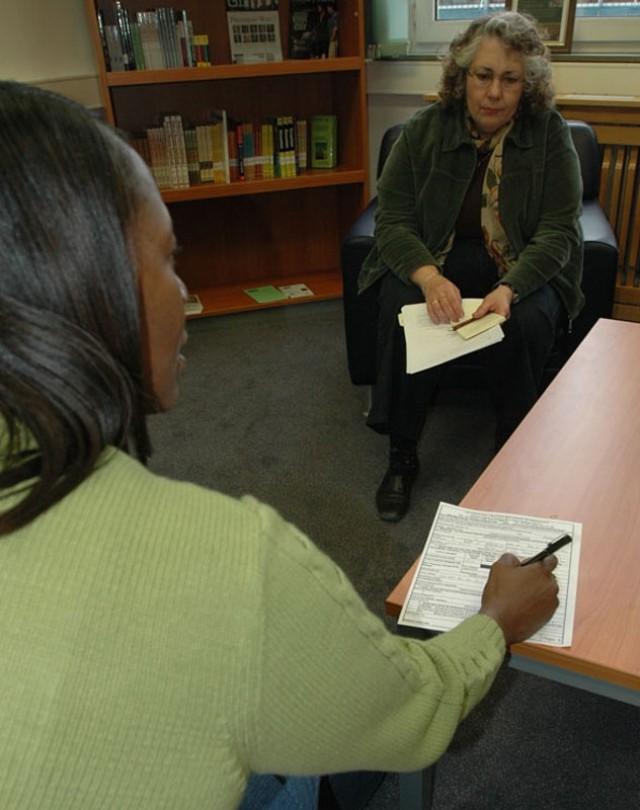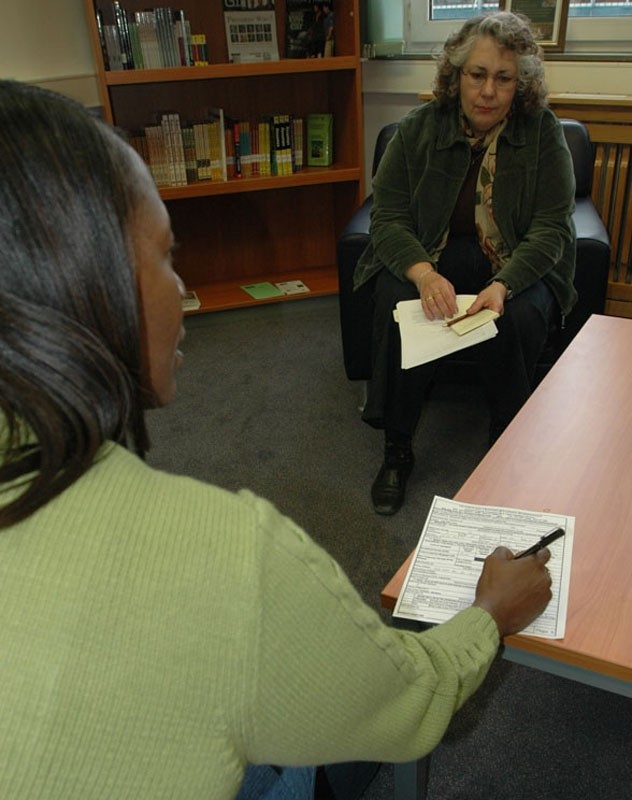HEIDELBERG, Germany - Each movement on the couch causes visible pain to Sgt. 1st Class Priscilla Simmons. However, a smile on her face tells the story of a warrior who has found the right place to rest and heal.
"The walls were closing in on me," she said, referring to her bedridden status before being assigned to the Warrior Transition Unit here in November 2007.
After a deployment to Kosovo aggravated a previous serious injury, Simmons found herself almost immobile, with a husband constantly travelling and two children in college who were concerned but unable to physically help their mother.
Now with the Heidelberg Soldier and Family Assistance Center working in partnership with the WTU to provide support services, "my entire family has piece of mind," Simmons said.
The SFAC, which officially opened April 3 at the Heidelberg Shopping Center, provides a "warm, relaxed environment" where Soldiers and their families can gather to foster physical, spiritual and mental healing, said SFAC specialist Rose Parker.
Operational since Jan. 4, the center, which is located next to Army Community Services, is designed as a one-stop location designed to provide support services regarding finances, child care, family advocacy, budgeting, chaplain assistance, legal assistance, military personnel issues, logistics and transportation, installation access, benefits counseling, education and employment opportunities.
"The services are individualized," Parker said. "We are working hard to link with all the other services from housing to reassignment; most have been very accommodating."
Such collaboration results from people recognizing that many wounded warriors do not have the stamina to do simple things like climb stairs - in a building without an elevator - to make complex decisions about their future.
Therefore, Parker brings the office to the Soldier.
"It's overwhelming when she brings people to me when I need it," Simmons said. "She told me, 'whatever you need, I can get it done.'"
Part of that help included finding a house that was disability friendly.
"What she found was perfect, like it was made for me," Simmons said. "There is even a German physical therapy facility nearby."
Simmons' former unit was concerned and cared about her situation, but no normal office is equipped to sustain long-term assistance and support of injured Soldiers like those services provided by a WTU.
Time-consuming tasks - completing paperwork for medical evaluation boards; applying for benefits; researching options for re-enlistment or transition - can be overwhelming for someone who is healing, said Staff Sgt. Marc Wilson, WTU cadre, and Simmons' squad leader.
"We have people helping Soldiers make the best decisions about retirement, re-upping or transitioning," he said. "We ensure their pay is right and help them apply for benefits, making sure that healing takes place whether it is in or out of the military."
While still wearing the uniform, the Army expects Soldiers to be productive while they are recovering. "That is a requirement," Wilson said.
For Simmons, that entails pursuit of her Doctor of Theology degree and preparing for retirement.
"My plan (as a civilian) is to help other Soldiers, to share my experiences," she said. "My short-term goal is to drive again."
The WTU concept goes back to medical holdover operations that began in 2003, as large numbers of Reserve Component Soldiers were mobilized in support of operations Enduring and Iraqi Freedom.
As the population of mobilized Soldiers needing medical evaluation and treatment rose, the Army established accelerated access standards, dedicated providers and case managers, additional installation support structure and other provisions required in assisting troops receiving medical care at an Army facility.
The term medical holdover, which has given way to warrior in transition, was coined to define the population of active-duty, mobilized Soldiers who are:
*assigned to a medical hold company;
*on active duty medical extension status;
*going through a Medical Evaluation Board;
*requiring complex medical care for more than six months.
Not eligible are those:
*pending an investigation, UCMJ or administrative separation;
*having a normal, uncomplicated pregnancy;
*with permanent profiles requiring a mandatory medical retention board.
A warrior in transition will normally remain at home station and be reassigned to the WTU while awaiting MEB/ PEB results. But this is not fixed in stone, Parker said. "The Army will do whatever is best for the Soldier."
There are currently 20 Soldiers in the Heidelberg WTU, which covers the military communities of Hanau, Darmstadt, Mannheim, Stuttgart and Heidelberg, said Capt. Stephen Hyder, WTU commander, who has seven squad leaders responsible for up to 12 Soldiers each. "Their job is direct supervision and assistance day and night, of these (wounded troops)," Hyder said.
For the two squad leaders in Heidelberg, the opening of the SFAC is making that job easier.
"We are pulling this together from scratch. Now that we have the space, it is working very well," Parker said. "The SFAC is not just here for the Soldier, but for the whole family."


Social Sharing